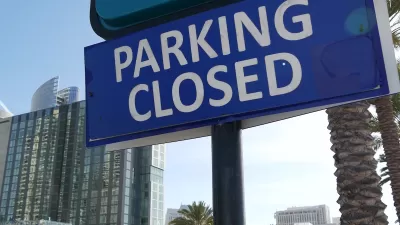Cities around the world are finding ways to go on a parking diet, freeing up unused space. San Francisco and Philadelphia are two U.S. leaders, while cities like Paris, Copenhagen, and Zurich pursue even more aggressive measures.

Though it's necessary in cities designed around the car, the way most cities provide for parking is hardly efficient. "'As parking regulations were put into zoning codes, most of the downtowns in many cities were just completely decimated,' says Michael Kodransky, global research manager for the Institute of Transportation and Development Policy. “What the cities got, in effect, was great parking. But nobody goes to a city because it has great parking.'"
The first step toward addressing the problem is simply measuring it. From Nate Berg's article: "Knowing the parking inventory has made it easier for the city to pursue public space improvements such as adding bike lanes or parklets, using the data to quell inevitable neighbourhood concerns about parking loss."
Invoking UCLA parking guru Donald Shoup, Berg writes, "After San Francisco implemented a pilot project with real-time data on parking availability and dynamic pricing for spaces, an evaluation found that the amount of time people spent looking for parking fell by 43%." Philadelphia's efforts to inventory parking have also led to space gains.
Outside the U.S., many cities have undertaken more aggressive strategies. "In 1996, [Zurich, Switzerland] decreed that there would be no more parking: officials placed a cap on the amount of parking spaces that would exist there, putting in place a trading system by which any developer proposing new parking spaces would be required to remove that many parking spaces from the city's streets."
Since 2003, Paris eliminated roughly 15,000 above-ground parking spaces. "São Paulo, for instance, got rid of its minimum parking requirements and implemented a maximum that could be built into specific projects. Beijing, Shenzhen and Guangzhou are hoping to emulate San Francisco's dynamic pricing approach."
FULL STORY: Lots to lose: how cities around the world are eliminating car parks

Planetizen Federal Action Tracker
A weekly monitor of how Trump’s orders and actions are impacting planners and planning in America.

Maui's Vacation Rental Debate Turns Ugly
Verbal attacks, misinformation campaigns and fistfights plague a high-stakes debate to convert thousands of vacation rentals into long-term housing.

Restaurant Patios Were a Pandemic Win — Why Were They so Hard to Keep?
Social distancing requirements and changes in travel patterns prompted cities to pilot new uses for street and sidewalk space. Then it got complicated.

In California Battle of Housing vs. Environment, Housing Just Won
A new state law significantly limits the power of CEQA, an environmental review law that served as a powerful tool for blocking new development.

Boulder Eliminates Parking Minimums Citywide
Officials estimate the cost of building a single underground parking space at up to $100,000.

Orange County, Florida Adopts Largest US “Sprawl Repair” Code
The ‘Orange Code’ seeks to rectify decades of sprawl-inducing, car-oriented development.
Urban Design for Planners 1: Software Tools
This six-course series explores essential urban design concepts using open source software and equips planners with the tools they need to participate fully in the urban design process.
Planning for Universal Design
Learn the tools for implementing Universal Design in planning regulations.
Heyer Gruel & Associates PA
JM Goldson LLC
Custer County Colorado
City of Camden Redevelopment Agency
City of Astoria
Transportation Research & Education Center (TREC) at Portland State University
Jefferson Parish Government
Camden Redevelopment Agency
City of Claremont





























